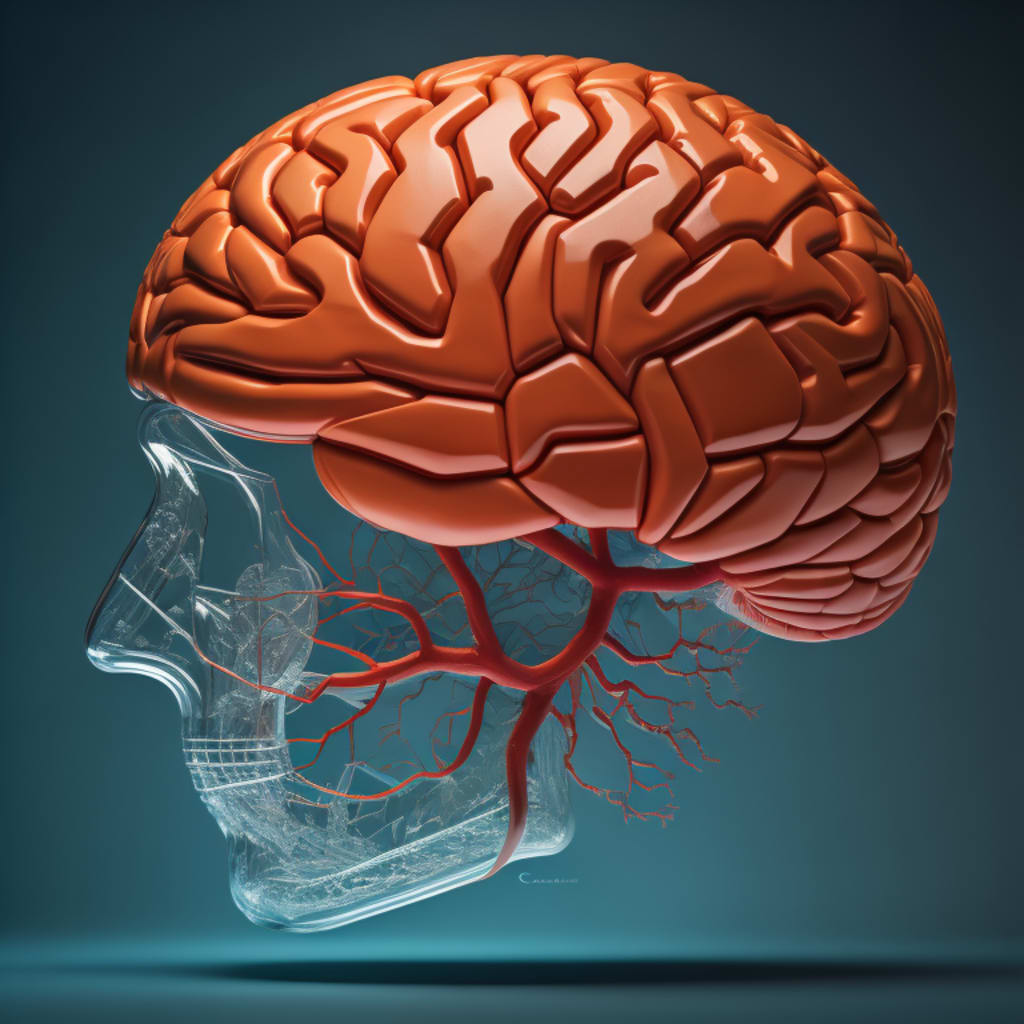7 Effective Ways To Boost Your Brain Power
Including the health benefits of each way

Introduction
Our brain is a powerful and intricate organ that plays a vital role in every aspect of our lives. Just like any other part of our body, it requires care and attention to function at its best. Fortunately, there are several strategies you can implement to enhance your brain power and cognitive function. In this article, we'll explore seven effective ways to boost your brain power and improve your overall mental well-being.
1. Stay Physically Active

Regular exercise isn't just beneficial for your body; it also has a significant impact on your brain’s health. Physical activity increases blood flow to the brain, delivering essential nutrients and oxygen. Exercise also promotes the release of chemicals like endorphins and brain-derived neurotrophic factor (BDNF), which are crucial for cognitive function and mood regulation.
Staying physically active has numerous benefits for brain health, as research has shown that there is a strong connection between physical activity and cognitive function. Here are some ways in which staying physically active can help improve brain health:
Increased Blood Flow: Physical activity increases blood flow throughout the body, including the brain. Improved blood circulation ensures that the brain receives an adequate supply of oxygen and nutrients, which are essential for optimal brain function.
Neurotransmitter Release: Exercise stimulates the release of various neurotransmitters, such as dopamine and serotonin, which play crucial roles in mood regulation, stress reduction, and overall cognitive function.
Neurogenesis: Physical activity has been linked to the generation of new neurons (neurogenesis) in the hippocampus, a brain region associated with learning and memory. This process is believed to contribute to improved cognitive abilities and the formation of new memories.
Brain-Derived Neurotrophic Factor (BDNF): Exercise increases the production of BDNF, a protein that supports the growth and maintenance of neurons. Higher levels of BDNF are associated with improved cognitive function, enhanced learning, and better memory.
Reduced Inflammation: Regular physical activity can help reduce inflammation in the body, including the brain. Chronic inflammation has been linked to cognitive decline and an increased risk of neurodegenerative diseases.
Stress Reduction: Exercise is a known stress reliever. Lowering stress levels through physical activity can have a positive impact on cognitive function, as high stress levels can impair memory and other cognitive processes.
Enhanced Brain Connectivity: Physical activity has been shown to promote better connectivity between different areas of the brain, which can lead to improved cognitive flexibility, problem-solving abilities, and creativity.
Protection Against Neurodegenerative Diseases: Engaging in regular physical activity has been associated with a reduced risk of developing neurodegenerative diseases such as Alzheimer's and Parkinson's disease. It may help slow down cognitive decline and delay the onset of these conditions.
Improved Mood and Mental Health: Exercise has been shown to have a positive impact on mood and mental health. When you feel better emotionally, your cognitive function tends to improve as well.
Sleep Quality: Regular physical activity can lead to better sleep quality. Restorative sleep is essential for cognitive function, memory consolidation, and overall brain health.
It's important to note that the benefits of physical activity on brain health are not limited to a specific age group. Both young and older individuals
can experience positive effects on cognitive function by incorporating regular exercise into their routines. The type, intensity, and duration of exercise can vary based on individual preferences and health considerations. Always consult with a healthcare professional before making significant changes to your exercise routine, especially if you have any underlying health conditions.
2. Prioritize Quality Sleep

Sleep is essential for memory consolidation, learning, and overall cognitive function. Aim for 7-9 hours of quality sleep each night to allow your brain to recharge and process information. Create a calming bedtime routine, avoid screens before sleep, and maintain a consistent sleep schedule to optimize your sleep quality.
A good night's sleep is essential for maintaining optimal brain health and functioning. Sleep plays a crucial role in various cognitive processes, emotional well-being, memory consolidation, and overall brain performance. Here are some key reasons why a good night's sleep is important for brain health:
Memory Consolidation: During sleep, the brain processes and consolidates information gathered throughout the day. It helps to solidify new memories, enhance learning, and improve the retention of information. Adequate sleep is particularly important for both short-term and long-term memory.
Cognitive Function: Sleep is vital for maintaining cognitive functions such as attention, problem-solving, decision-making, and creativity. Sleep deprivation can lead to difficulties in concentrating, decreased alertness, and impaired judgment.
Emotional Regulation: Sleep plays a significant role in regulating emotions and mood. Lack of sleep can lead to increased irritability, mood swings, and heightened emotional responses. It may also contribute to the development or exacerbation of mood disorders such as depression and anxiety.
Neuroplasticity: Sleep is crucial for the brain's ability to adapt and change, known as neuroplasticity. During sleep, the brain reorganizes and strengthens neural connections, which is essential for learning and adapting to new experiences.
Brain Detoxification: Recent research has shown that during sleep, the brain's glymphatic system becomes more active, helping to clear away waste products and toxins that accumulate throughout the day. This detoxification process is thought to be important for maintaining brain health and preventing the buildup of harmful substances.
Hormone Regulation: Sleep is involved in regulating the release of hormones that affect various bodily functions, including those that influence stress responses, appetite, and metabolism. Disrupted sleep patterns can lead to imbalances in these hormones, potentially impacting overall health.
Neurological Health: Adequate sleep is associated with a reduced risk of neurodegenerative disorders such as Alzheimer's and Parkinson's disease. Chronic sleep deprivation may contribute to the accumulation of proteins associated with these conditions, potentially increasing the risk of their development.
Brain Repair and Growth: Sleep is a time of repair and restoration for the brain. It allows for the repair of damaged neurons and the growth of new ones, supporting overall brain health and resilience.
In summary, a good night's sleep is essential for maintaining optimal brain health. Consistently getting enough quality sleep is crucial for cognitive function, emotional well-being, memory consolidation, and overall brain performance. Prioritizing sleep hygiene and establishing healthy sleep habits can significantly contribute to maintaining a healthy brain throughout life.
3. Maintain a balanced diet

The food you consume directly impacts your brain's health and function. Incorporate a variety of nutrient-rich foods into your diet, including fruits, vegetables, whole grains, lean proteins, and healthy fats. Omega-3 fatty acids, found in foods like fatty fish and walnuts, are particularly beneficial for brain health.
A balanced diet plays a crucial role in supporting brain health and cognitive function. Here are some key benefits of a balanced diet on brain health:
Nutrient Supply: A balanced diet provides essential nutrients such as vitamins, minerals, antioxidants, and omega-3 fatty acids that are vital for optimal brain function. These nutrients contribute to maintaining the structure of brain cells, promoting nerve transmission, and protecting brain tissue from oxidative stress.
Cognitive Function: Nutrient-rich foods can enhance cognitive abilities such as memory, attention, and problem-solving. For instance, foods rich in antioxidants (e.g., berries, leafy greens) help reduce inflammation and oxidative damage, which can negatively impact cognitive function.
Neurotransmitter Production: Certain nutrients from a balanced diet are precursors for the production of neurotransmitters, which are chemical messengers that transmit signals between brain cells. For example, tryptophan, found in foods like turkey and dairy products, is essential for producing serotonin, a neurotransmitter that regulates mood and sleep.
Brain Plasticity: A balanced diet supports brain plasticity, which is the brain's ability to adapt and reorganize itself throughout life. Nutrients like omega-3 fatty acids found in fish and nuts help maintain the integrity of brain cell membranes and promote synaptic plasticity, enabling efficient communication between neurons.
Energy Supply: The brain requires a significant amount of energy to function properly. Carbohydrates from whole grains, fruits, and vegetables provide the brain with a steady supply of glucose, its primary energy source. Maintaining stable blood sugar levels through a balanced diet helps sustain optimal brain function.
Reduced Risk of Neurological Disorders: A diet rich in antioxidants, healthy fats, and anti-inflammatory foods has been associated with a reduced risk of neurodegenerative disorders such as Alzheimer's and Parkinson's diseases. These foods can help protect brain cells from damage and maintain overall brain health.
Gut-Brain Connection: Emerging research highlights the importance of the gut-brain connection. A balanced diet that includes fiber-rich foods and probiotics supports a healthy gut microbiome, which in turn can positively influence brain health by influencing neurotransmitter production and reducing inflammation.
Mood Regulation: Certain nutrients, such as B vitamins, zinc, and magnesium, are essential for mood regulation and the production of neurotransmitters related to emotional well-being. Including foods like whole grains, lean proteins, and leafy greens can help support stable moods.
Brain Aging: A balanced diet rich in antioxidants and healthy fats can slow down age-related cognitive decline. Consuming foods with anti-aging properties can help protect brain cells from damage and maintain cognitive function as you age.
Hydration: Staying adequately hydrated is crucial for brain function. Dehydration can impair cognitive performance, attention, and memory. Drinking water and consuming hydrating foods like fruits and vegetables contribute to optimal brain hydration.
Remember that a balanced diet is just one component of a healthy lifestyle for brain health. Regular physical activity, adequate sleep, stress management, and cognitive stimulation also play important roles in maintaining and enhancing cognitive function throughout life.
4. Engage In Mental Stimulation

Keep your brain engaged by regularly challenging it with new and complex activities. Learning a new language, playing musical instruments, solving puzzles, or engaging in strategic games can help stimulate different areas of your brain, enhancing cognitive flexibility and problem-solving skills.
Mental stimulation plays a crucial role in maintaining and enhancing brain health. Engaging in intellectually challenging and stimulating activities can have a positive impact on various aspects of brain function and overall cognitive well-being. Here are some ways in which mental stimulation contributes to brain health:
Neuroplasticity: Neuroplasticity refers to the brain's ability to reorganize itself by forming new neural connections throughout life. Mental stimulation, such as learning new skills, solving puzzles, or engaging in novel activities, promotes the development of new neural pathways and strengthens existing connections. This enhances the brain's adaptability and resilience, which are essential for maintaining cognitive function as we age.
Cognitive Reserve: Mental stimulation helps build cognitive reserve, which acts as a protective buffer against cognitive decline and neurological disorders such as Alzheimer's disease. People with higher cognitive reserves may experience fewer noticeable cognitive deficits even in the presence of brain pathology, as their brains are better equipped to compensate for damage.
Memory and Learning: Engaging in activities that challenge memory and learning, such as studying a new language, playing musical instruments, or engaging in complex problem-solving, helps improve these cognitive functions. It exercises the brain's memory systems and reinforces neural pathways involved in information retention and retrieval.
Attention and Focus: Activities that require sustained attention and focus, like reading, meditation, or mindfulness exercises, can enhance concentration skills. Regular practice of such activities may lead to improved cognitive control and better attentional abilities.
Creativity and Innovation: Mental stimulation encourages creative thinking and innovation. Engaging in creative endeavors such as art, writing, or brainstorming can help develop new neural pathways and foster the generation of novel ideas.
Stress Reduction: Participating in intellectually engaging activities can reduce stress and anxiety. Chronic stress has been linked to negative effects on brain health, including impairments in memory and cognitive function. Engaging in mentally stimulating activities can help mitigate the harmful effects of stress.
Social Interaction: Many mentally stimulating activities, such as group discussions, board games, and team-based activities, involve social interaction. Social engagement has been shown to have a positive impact on brain health by promoting communication skills, empathy, and emotional well-being.
Brain Connectivity: Mental stimulation can enhance communication between different regions of the brain. Engaging in diverse activities that challenge various cognitive functions can lead to improved brain connectivity and integration.
Mood Regulation: Mental stimulation can contribute to improved mood and mental well-being. Engaging in enjoyable and intellectually fulfilling activities can release neurotransmitters and endorphins that positively affect mood and reduce the risk of mood disorders.
Overall, maintaining an intellectually active lifestyle through continuous learning, problem-solving, creative expression, and social engagement is crucial for optimizing brain health. Just like physical exercise is important for the body, mental stimulation is essential for keeping the brain in good shape and reducing the risk of cognitive decline.
5. Practice Mindfulness and Meditation

Mindfulness practices and meditation can help reduce stress, improve focus, and enhance cognitive function. These techniques encourage you to stay present in the moment, promoting relaxation and mental clarity. Regular practice has been shown to lead to positive changes in brain structure and function over time.
Mindfulness and meditation has been the subject of numerous scientific studies, and there is growing evidence to suggest that it can have positive effects on brain health. Some of the benefits of mindfulness meditation on brain health include:
Stress Reduction: Mindfulness and meditation have been shown to reduce the production of stress hormones like cortisol. Chronic stress can have negative effects on the brain, including impairing memory and cognitive function. By reducing stress, mindfulness meditation may protect the brain from these harmful effects. Improved Attention and Concentration: Mindfulness meditation involves focusing your attention on the present moment. Regular practice can lead to improvements in sustained attention, cognitive flexibility, and working memory. This may result in better concentration and cognitive abilities.
Enhanced Emotional Regulation: Mindfulness meditation can help regulate emotions by increasing awareness of your emotional experiences. This may lead to improved emotional resilience and a reduced likelihood of experiencing intense mood swings.
Reduced Anxiety and Depression: Studies have shown that mindfulness meditation can be effective in reducing symptoms of anxiety and depression. It may lead to changes in brain structures associated with these conditions, promoting emotional well-being.
Increased Gray Matter Density: Mindfulness meditation has been associated with increases in gray matter density in brain regions involved in learning, memory, emotion regulation, and self-awareness. This suggests potential neuroplastic changes associated with mindfulness practice.
Enhanced Neuroplasticity: Mindfulness meditation may promote neuroplasticity, which refers to the brain's ability to reorganize and adapt. This can potentially lead to improved learning, memory, and cognitive function.
Slower Age-Related Cognitive Decline: Some research suggests that mindfulness meditation might help slow down age-related cognitive decline and reduce the risk of neurodegenerative diseases by promoting brain health and cognitive resilience.
Better Sleep Quality: Mindfulness meditation has been shown to improve sleep quality. Adequate sleep is essential for brain health, and improving sleep patterns through mindfulness may contribute to overall cognitive well-being.
Pain Management: Mindfulness meditation can be effective in reducing the perception of pain. Brain imaging studies have shown that mindfulness practice can lead to changes in brain regions involved in pain processing.
Enhanced Self-Awareness: Mindfulness meditation encourages introspection and self-awareness, which can lead to a better understanding of one's thoughts, feelings, and behaviors. This increased self-awareness may contribute to improved decision-making and emotional regulation.
It's important to note that while there is a growing body of research supporting the benefits of mindfulness meditation on brain health, individual experiences may vary. Regular and consistent practice over time seems to be the key to experiencing these positive effects. As with any health-related practice, it's advisable to consult with a healthcare professional before starting any new meditation or mindfulness routine, especially if you have underlying medical conditions.
6. Cultivate Social Connections

Human interaction and social engagement are crucial for maintaining brain health. Engaging in meaningful conversations, spending time with loved ones, and participating in social activities can help ward off cognitive decline and improve overall mental well-being.
Social connections play a significant role in brain health and overall well-being. Numerous studies have shown that maintaining strong social relationships and engaging in regular social interactions can have positive effects on various aspects of brain function. Here are some ways in which social connections can impact brain health:
Cognitive Stimulation: Engaging in meaningful conversations, discussions, and activities with others can provide cognitive stimulation. These interactions challenge the brain, promoting the growth of new neural connections and helping to maintain cognitive function as you age.
Emotional Support: Social connections provide emotional support, which can reduce stress and anxiety. Positive social interactions trigger the release of hormones like oxytocin, which can promote feelings of well-being and reduce the impact of stress on the brain.
Brain Plasticity: Social interactions can contribute to brain plasticity, which is the brain's ability to adapt and change over time. Engaging with a diverse group of people and participating in various social activities can help keep your brain flexible and responsive to new experiences.
Mental Health: Strong social connections are associated with lower rates of depression and anxiety. Social isolation, on the other hand, can increase the risk of mental health issues and even contribute to cognitive decline.
Physical Health: Social engagement has been linked to improved physical health, which in turn supports brain health. Healthy lifestyle habits encouraged by social interactions, such as regular physical activity and a balanced diet, can have positive effects on brain function.
Reduced Risk of Cognitive Decline: Research suggests that individuals with larger and more active social networks tend to have a reduced risk of cognitive decline and dementia. Social engagement may help create a "cognitive reserve," which can protect the brain from the effects of aging and disease.
Motivation and Goals: Social connections can provide motivation, encouragement, and a sense of purpose. Having social support can make it easier to set and achieve goals, which can contribute to a sense of accomplishment and overall brain health.
Neurotransmitter Regulation: Positive social interactions can lead to the release of neurotransmitters such as dopamine and serotonin, which are associated with pleasure, mood regulation, and feelings of happiness. These neurotransmitters play a role in maintaining a healthy brain.
It's important to note that the quality of social connections matters more than the quantity. Meaningful, supportive relationships have a more significant impact on brain health than a large number of superficial connections. Therefore, fostering genuine relationships and regularly engaging in social activities that you enjoy can contribute to improved brain health and overall well-being.
7. Continuous Learning

Embrace a growth mindset and never stop learning. Whether it's through formal education, reading books, attending workshops, or taking online courses, continuous learning keeps your brain active and adaptable. It encourages neural connections and helps prevent the cognitive decline associated with aging.
Continuous learning has been associated with numerous benefits for brain health and cognitive function. Here are some of the key advantages:
Neuroplasticity: Continuous learning involves acquiring new information and skills, which stimulates the brain's neuroplasticity—the ability of the brain to reorganize itself by forming new neural connections. This helps maintain and enhance cognitive flexibility, adaptability, and problem-solving abilities.
Cognitive Reserve: Engaging in lifelong learning contributes to the development of cognitive reserve—a mental resilience that enables individuals to better cope with brain changes associated with aging and neurodegenerative diseases like Alzheimer's. A higher cognitive reserve has been linked to delayed onset and slower progression of cognitive decline.
Memory Improvement: Learning new information and skills challenges your memory systems, promoting their activation and strengthening. This can lead to improved memory retention and recall abilities.
Attention and Concentration: Learning new topics or skills requires focused attention and concentration, which can help improve your ability to sustain attention and resist distractions in various aspects of your life.
Stress Reduction: Engaging in learning activities you find enjoyable can serve as a form of stress relief. Learning can provide a sense of accomplishment and satisfaction, releasing dopamine and other neurochemicals associated with positive emotions.
Enhanced Problem-Solving: Continuously exposing yourself to new challenges and ideas through learning enhances your ability to think critically, analyze situations, and come up with innovative solutions.
Mental Stimulation: Learning keeps your mind active and engaged, reducing the risk of mental stagnation. It has been suggested that engaging in intellectually stimulating activities may help reduce the risk of cognitive decline and related disorders.
Lifelong Social Engagement: Many learning activities, such as joining classes or discussion groups, foster social interactions. Social engagement is known to have positive effects on brain health, as it provides opportunities for cognitive stimulation and emotional connection.
Positive Impact on Mood: Learning new things can boost your self-esteem, confidence, and overall sense of achievement, leading to improved mood and emotional well-being.
Delaying Cognitive Aging: Some research suggests that engaging in cognitive activities throughout your life may help delay the onset of age-related cognitive decline and neurodegenerative diseases.
Quality of Life: Continuous learning contributes to a more active and fulfilling lifestyle, potentially leading to a higher overall quality of life as you age.
It's important to note that the specific benefits can vary depending on the type of learning, the individual's preferences, and other factors. Overall, a diverse range of learning experiences—such as acquiring new skills, exploring different subjects, engaging in creative pursuits, and staying socially connected—can contribute to maintaining and enhancing brain health throughout your life.
Conclusion

Boosting your brain power involves a holistic approach that encompasses physical, mental, and emotional well-being. By incorporating regular exercise, prioritizing sleep, maintaining a balanced diet, engaging in mental stimulation, practicing mindfulness, nurturing social connections, and embracing continuous learning, you can optimize your brain's potential and lead a more fulfilling life. Remember that these changes
take time and consistency, so start small and gradually integrate them into your daily routine for long-lasting cognitive benefits.
About the Creator
Enjoyed the story? Support the Creator.
Subscribe for free to receive all their stories in your feed. You could also pledge your support or give them a one-off tip, letting them know you appreciate their work.
Reader insights
Outstanding
Excellent work. Looking forward to reading more!
Top insights
Easy to read and follow
Well-structured & engaging content
Expert insights and opinions
Arguments were carefully researched and presented
Eye opening
Niche topic & fresh perspectives
On-point and relevant
Writing reflected the title & theme





Comments (1)
Thank You so much for provinding such an useful information to me. May God bless you!